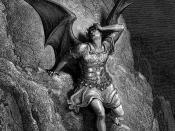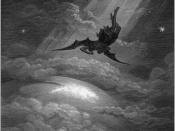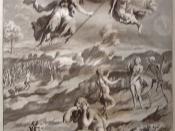Satan is not meant to be looked at as a hero or as sympathetic in Milton's Paradise Lost, as many critics like to argue. He symbolizes temptation in disguise, and seeks to destroy "The whole included race, his purposed prey" by implanting his offspring, evil, and cultivating its growth throughout mankind. Together Adam and Eve represent humankind in Paradise Lost. In life, they represent the whole of the human psyche, Adam is Reason and Eve, Passions. Evil is no match against the entirety of the soul but when separated it is not difficult for temptation to overcome the weaker of the two, Passion.
The prologue of Paradise Lost tells how Milton's style of writing is very revolutionary. "Milton committed himself to disrupting the received wisdom of the classics and the Church in order to discover truths verifiable by experience." The point of Milton's writing is to empower the mind, and free us to make our own decisions about his writing.
This strengthens our powers of reason. When our reason is the ruling agent in our psyche, we have a strong guard against temptations. We want to be virtuous without being told, just like Eve in Paradise Lost. "And what is faith, love, virtue, unassayed alone, without exterior help sustained?" She wants to prove these virtues on her own without outside help. Our passions are always being tested and, when separated from reason, can be easily overcome be temptation.
The liberation that Milton has in mind for his readers and that of Satan to Adam and Eve is not the same, they are distinctly opposing goals. Satan works on the passions first since they are the weaker part, instilling in Eve a sense of false liberty. Satan's attack on Eve is disguised as he flatters and begins to...


